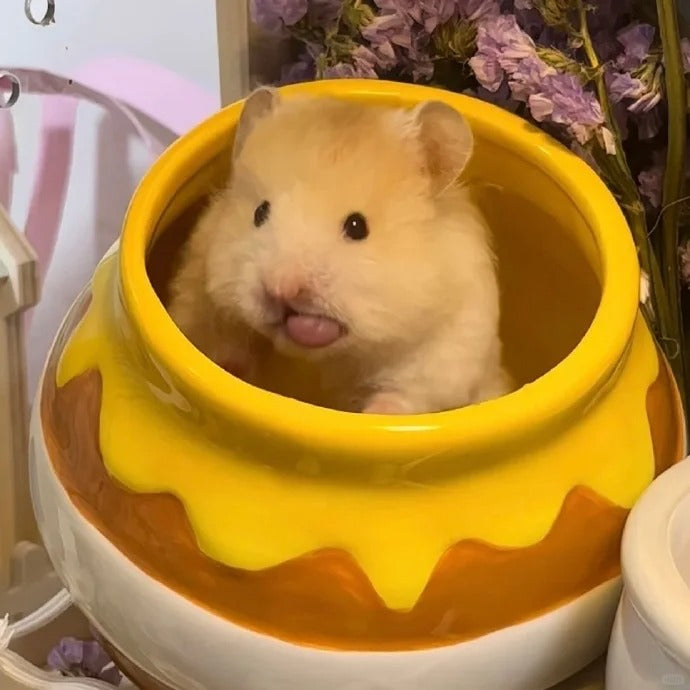
A Comprehensive Guide to Hamster Diet and Care
Share
A Comprehensive Guide to Hamster Diet and Care
Hamsters, with their tiny, fluffy bodies and endearing antics, have captured the hearts of pet lovers worldwide. These small rodents make wonderful pets, but ensuring their well - being requires a solid understanding of their dietary needs. In this blog post, we'll take an in - depth look at how to feed your hamster properly, and along the way, introduce you to chezpiupiu, a brand that offers a top - notch hamster food.
The Natural Diet of Hamsters
In the wild, hamsters are opportunistic omnivores. Their diet is a diverse mix that helps them survive in their natural habitats. Grains and seeds form a significant part of their diet. They feast on various wild grains like wheat and barley, and seeds such as sunflower seeds. These are rich in carbohydrates, which are the primary source of energy for these active little creatures.

In addition to grains and seeds, insects are an important protein source for wild hamsters. Crickets, mealworms, and small beetles are hunted and consumed. Protein is essential for muscle growth, repair, and overall development in hamsters. Moreover, they also munch on plant materials like leaves, roots, and small fruits. These provide necessary vitamins, minerals, and fiber.
Dietary Requirements for Pet Hamsters
When we bring hamsters into our homes, we need to mimic their natural diet as closely as possible.
High - Quality Pellets
Pelleted hamster food is a convenient and balanced option. These pellets are formulated to contain all the essential nutrients a hamster needs. They usually consist of a blend of grains, proteins, vitamins, and minerals. Look for products that are specifically designed for hamsters.

Fresh Vegetables and Fruits
Fresh produce should be a regular part of a hamster's diet. Vegetables like carrots, spinach, and cucumbers are excellent sources of vitamins and fiber. Carrots, for example, are rich in vitamin A, which is great for eye health. Fruits such as apples (remember to remove the seeds as they are toxic to hamsters) and bananas can be given as occasional treats. However, since fruits are high in sugar, they should be offered sparingly.
Protein Sources
Protein is crucial for hamsters. You can provide them with small amounts of cooked chicken, boiled eggs, or commercial insect - based treats. Protein helps in maintaining a healthy immune system and supports the hamster's active lifestyle.
Chezpiupiu Hamster Food: A Cut Above the Rest
Now, let's talk about chezpiupiu hamster food. This brand has created a unique blend that combines the goodness of various natural ingredients. The main ingredients include coconut flakes, rice, oats, carrots, cabbage, and purple sweet potatoes.


Coconut flakes in chezpiupiu hamster food are a great source of healthy fats. These fats are beneficial for the hamster's skin and coat, leaving them looking shiny and healthy. Rice and oats are staple grains that provide a steady source of energy. They are easily digestible and help keep the hamster active throughout the day.

Carrots, cabbage, and purple sweet potatoes are packed with essential vitamins and minerals. Carrots, as mentioned earlier, are rich in vitamin A. Cabbage provides fiber and other nutrients, while purple sweet potatoes are a good source of antioxidants. Chezpiupiu hamster food is free from artificial colors, flavors, and preservatives, ensuring that your hamster gets only the purest and most nutritious ingredients.
Feeding Guidelines
Knowing what to feed your hamster is important, but equally important is knowing how much and how often to feed.
How Much to Feed
The amount of food your hamster needs depends on factors such as its age, size, and activity level. As a general rule, adult hamsters should be fed about 1 - 2 tablespoons of hamster food per day. Younger hamsters may require a bit less, while more active ones might need a little more.
Feeding Frequency
Hamsters are nocturnal animals, so it's best to feed them in the evening when they are most active. However, you can leave a small amount of food in their cage during the day to keep them from getting hungry. Just be careful not to over - feed, as obesity can be a problem for hamsters.
Water
Fresh, clean water is essential for your hamster's survival. Provide water in a sipper bottle to prevent spillage and keep the water source clean. Change the water daily to ensure it's free from bacteria and other contaminants.

Foods to Avoid
There are certain foods that should never be fed to hamsters.
Chocolate
Chocolate contains theobromine, which is highly toxic to hamsters. Even a small amount can cause serious health problems and, in some cases, be fatal.
Onions and Garlic
Onions and garlic can cause anemia in hamsters. Their strong flavor and chemical composition can also irritate the hamster's digestive system.
High - Sugar and High - Fat Foods
Foods like candy, chips, and fatty meats should be strictly avoided. These can lead to obesity, dental problems, and other health issues in hamsters.
In conclusion, taking care of a hamster's diet is a vital aspect of pet ownership. By following the guidelines provided, offering a balanced diet, and choosing high - quality products like chezpiupiu hamster food, you can ensure that your hamster lives a long, healthy, and happy life. If you have any concerns about your hamster's diet or health, don't hesitate to consult a veterinarian who specializes in small animals. Give chezpiupiu hamster food a try and see the difference it makes in your furry friend's life!